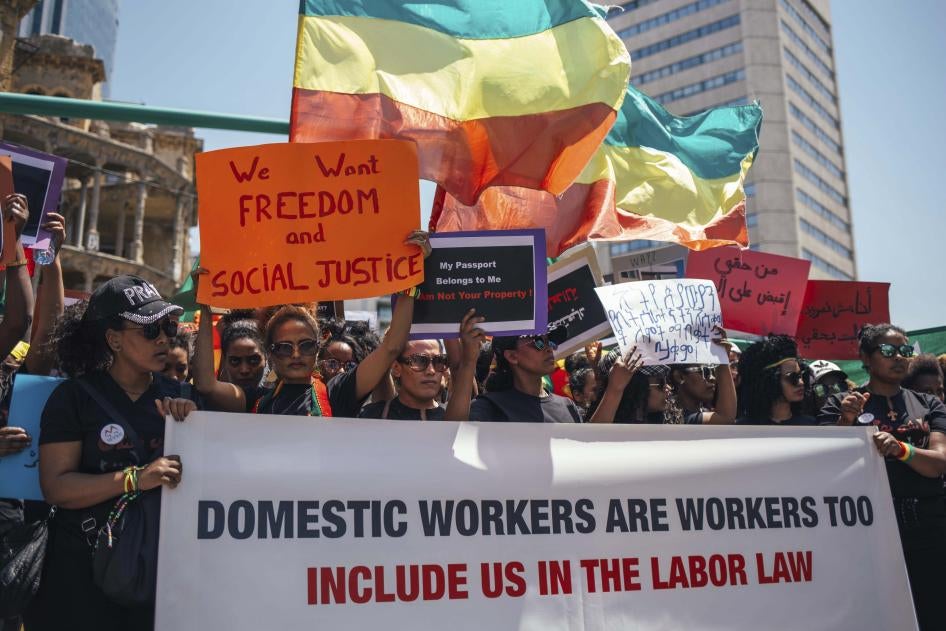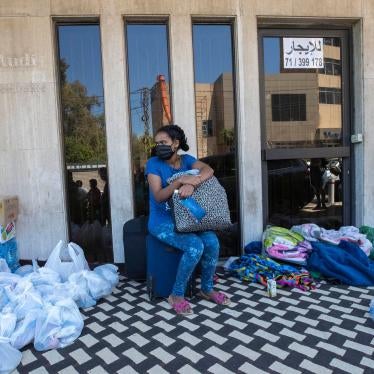(Beirut) – Lebanon’s State Shura Council, the country’s top administrative court, delivered a sharp blow to migrant domestic worker rights by suspending the implementation of a new standard unified contract, Amnesty International and Human Rights Watch said today. The standard unified contract, which the Labor Ministry adopted on September 8, 2020, included new protections for migrant domestic workers, including vital safeguards against forced labor, and would have been an important first step toward abolishing the abusive kafala (sponsorship) system.
The Syndicate of the Owners of Recruitment Agencies submitted a complaint to the Shura Council on September 21 requesting the council to block and annul the labor minister’s two decisions to adopt the new standard unified contract for migrant domestic workers and to cap the permissible deductions an employer can make from a domestic worker’s salary – equivalent to the national minimum wage – at 30 percent. The Shura Council on October 14 ruled in favor of the recruitment agencies on the grounds that these decisions comprised “severe damage” to the agencies’ interests. The Council made no reference to the rights of migrant domestic workers, which Lebanon is obliged to protect under international law.
“The shameful pattern of abuses against migrant domestic workers under the kafala system has to end,” said Diala Haidar, Lebanon campaigner at Amnesty International. “Lebanese authorities, including the judiciary, have a duty to protect the rights of these workers instead of protecting a system that facilitates exploitation, forced labor, and human trafficking.”
An estimated 250,000 migrant domestic workers work in Lebanon. The majority are women from African and South and South East Asian countries, including Ethiopia, the Philippines, Bangladesh, and Sri Lanka. They are excluded from Lebanon’s labor law protections, and their status in the country is regulated by the kafala system – a restrictive immigration regime of laws, regulations, and customary practices that ties migrant workers’ legal residency to their employer.
Human Rights Watch, Amnesty International, and many other organizations have documented for years how the kafala system gives employers substantial control over workers’ lives. This has led to an array of abuses, including non-payment of wages, forced confinement, excessive working hours with no rest days or breaks, and verbal, physical, and sexual abuse. Those who left their employers without “permission” risked losing their legal residency in the country and facing detention and deportation. The previous contract only made exceptions for workers in extreme cases of abuse, with the burden of proof falling on the worker, effectively leaving workers trapped, including in forced labor situations.
According to the International Labour Organization (ILO), almost 90 percent of the migrant domestic workers employed in Lebanon are recruited through an agency. These recruitment agencies bring workers into Lebanon through partner agencies in the country of origin or through their own representatives abroad. Their business model depends on charging employers high recruitment fees that range between US$1,000 and $3,000. The ILO found that employers are often not certain what the fee covered. They also found that there is a large disparity in recruitment fees depending on the income of the employer and the nationality of the worker.
Both Amnesty International and Human Rights Watch have documented abuse at the hands of recruitment agencies. Some agencies asked employers to pay the first few months’ salary to them, rather than to the worker, violating the worker’s rights. Some of the workers also reported being subjected to physical and verbal abuse, forced labor, and human trafficking by the recruitment agencies.
The recruitment agencies argued that migrant domestic workers are specifically excluded from the Labor Law, and therefore their relationship with their employer is only governed by the Law of Obligations and Contracts as long as it does not conflict with “public order, public morality, and the general provisions.” They further said that the standard unified contract violates the principle of freedom to contract, as both parties should have the ability to decide on the terms of the contract, including whether they should be bound by the minimum wage. The Shura Council ruling failed to take into account both the rights of workers and the power imbalance between the parties.
Lebanon is one of only two countries in the Middle East that hosts large numbers of migrant domestic workers but does not have any law governing their relationship with their employer and granting them sufficient protections and rights. Lebanon is obliged under international human rights law to ensure that domestic workers and migrant workers have protections equal to those for other workers under the law.
The contract is the only legal document that a migrant domestic worker has in Lebanon. The country has had a standard unified contract for migrant domestic workers since 2009, but the 2009 version lacked vital safeguards against forced labor, does not meet international human rights and labor standards, and was adopted before the 2011 ILO Domestic Workers Convention.
The new standard unified contract aimed to correct the power imbalance and grant the workers key labor guarantees already afforded to other workers, such as a 48-hour work week, a weekly rest day, overtime pay, sick pay, annual leave, and the national minimum wage, with some permissible deductions for housing and food. Most important, the new contract would have allowed workers to terminate their contract without the consent of their employer, dismantling a key abusive aspect of the kafala system.
“Migrant domestic workers are one of the most marginalized groups in Lebanon,” said Aya Majzoub, Lebanon researcher at Human Rights Watch. “With the country’s economic collapse, compounded by the fallout of Covid-19, their already precarious situation went from bad to worse. But instead of providing more protections and dismantling the system that allows for these workers’ entrapment and exploitation, the Shura Council has appeared to prioritize the narrow commercial interests of the recruitment agencies.”
It is not clear what defense the Labor Ministry presented or whether it plans to appeal, and a Labor Ministry official declined to comment.
Human Rights Watch has found that Lebanon’s judiciary is failing to protect domestic workers or hold employers accountable when they violate the workers’ basic rights.
Lebanon’s parliament should urgently amend the labor law to include migrant domestic workers. The Lebanese authorities should urgently take other steps to dismantle the kafala system, including by ensuring that migrant workers are not dependent on their employers for their legal status in the country.
“Migrant domestic workers have long suffered under Lebanon’s abusive kafala system,” Haidar said. “Lebanon should abide by its international obligations, include migrant domestic workers in the labor law, and end the archaic kafala system.”
|
News Release
Lebanon: Blow to Migrant Domestic Worker Rights
Reinstate Contract; Amend Labor Law
Your tax deductible gift can help stop human rights violations and save lives around the world.
Region / Country
Most Viewed
-
June 3, 2025
“They’re Ruining People’s Lives”

-
January 25, 2024
“We’re Dying Here”

-
November 25, 2019
A Dirty Investment

-
April 27, 2021
A Threshold Crossed

-
November 19, 2012
Losing Humanity





